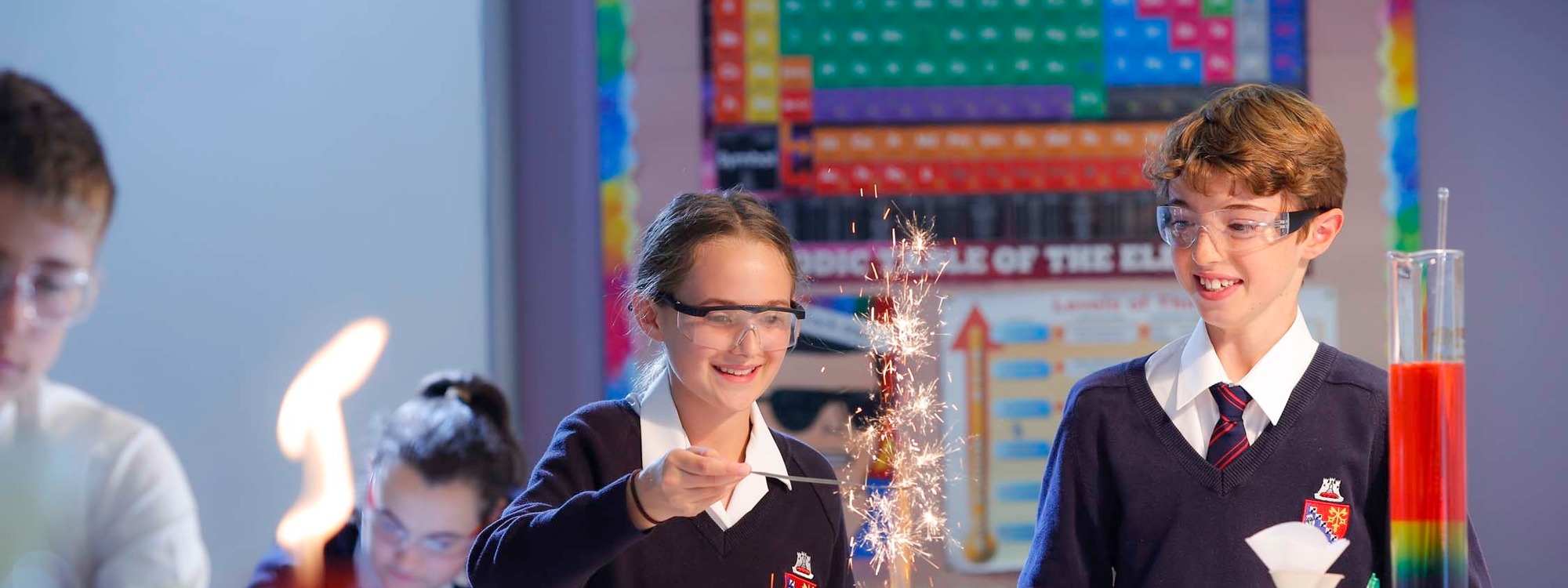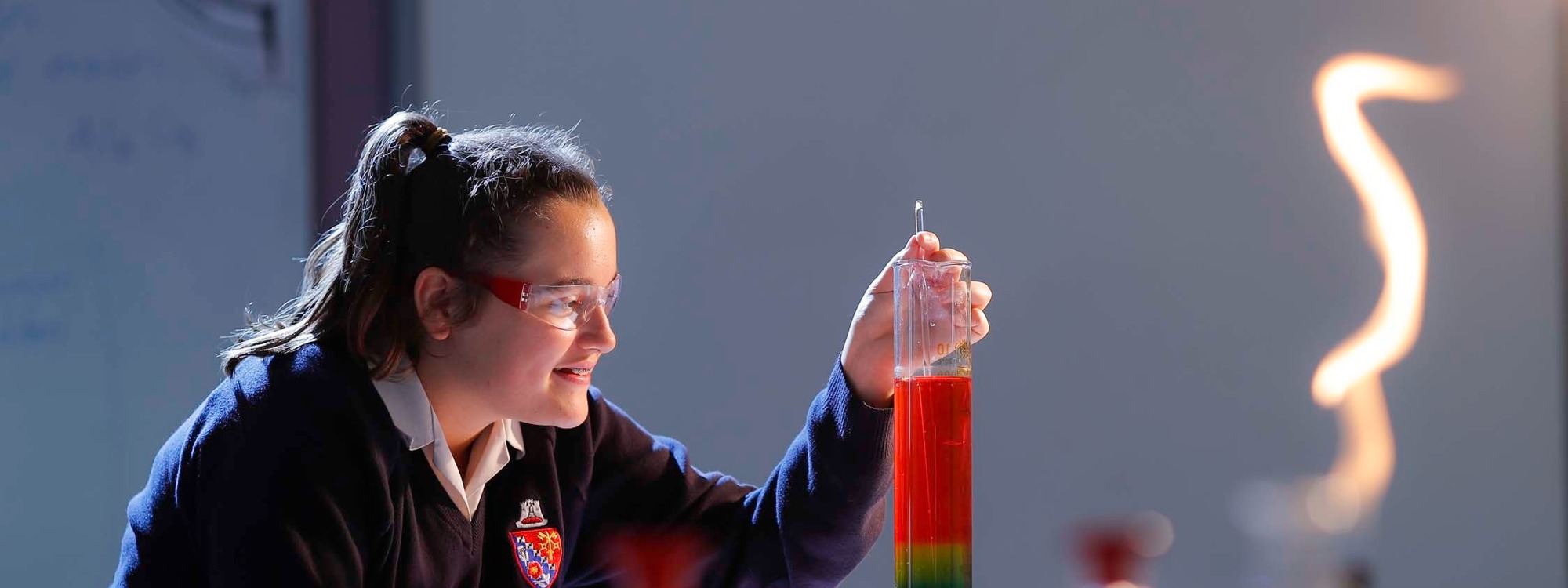
News - 18th May 2023


The study of science fires pupils’ curiosity about phenomena in the world around them and offers opportunities to find explanations. It engages learners at many levels, linking direct practical experience with scientific ideas. Experimentation and modelling are used to develop and evaluate explanations, encouraging critical and creative thought. Pupils learn how knowledge and understanding in science are rooted in evidence. They discover how scientific ideas contribute to technological change – affecting industry, business and medicine and improving quality of life. They trace the development of science worldwide and recognise its cultural significance. They learn to question and discuss issues that may affect their own lives, the directions of societies and the future of the world.
There are a number of key concepts that underpin the study of science and how science works. Students need to understand these concepts in order to deepen and broaden their knowledge, skills and understanding. Using scientific ideas and models to explain phenomena and developing them creatively to generate and test theories.
In Year 7 Students learn in their mixed ability Tutor groups.
In Year 8 Students are divided into three bands (w, x and y). Each band has three mixed ability sets.
KS4 students are divided into 2 bands (P and Q). In the ‘P’ band students are set from 1 to 5 and in the ‘Q’ band they are set from 1 to 6.
Ged Pounds – Subject Learning Leader
Natalie Kitchener – Deputy SLL in Science
Craig Sivyer - Curriculum and Assessment Development Lead
Lynsey McCahill – SENDCO
Mark Stevens - Designated Teacher
Kelly Tarlowski
Samantha Isard
Gina Archer
Toby May
Victoria Keast
Tory Leason
Sarah-Jane Charles
Lewis Parker
KS3
Pupils are formally assessed at the end of a cycle of learning. Each cycle of learning takes approximately a term and involves covering at least one topic from each of the Biology, Chemistry and Physics disciplines. The formal assessments will only assess the pupils’ understanding of the content covered during that cycle.
KS4
Year 9
Y9 pupils will be sit separate assessments in Biology, Chemistry and Physics at the end of a cycle of learning, that will assess their understanding of the content covered in that cycle. At the end of the third term, their formal assessment will be a 60 minute exam, which will take place in Y9 prelim week, and will assess all the content they have covered in that year. The topics covered in year 9 are:
Biology – Cell structure and transport, Cell division, Organisation and the Digestive system, Organising Animals and Plants, and, Communicable disease.
Chemistry – Atomic Structure and the Periodic Table, Structure and Bonding and Chemical Calculations
Physics – Energy and Electric Circuits
To help Year 9 pupils prepare for their exams, revision resources for each Science can be found on Subjects Handouts, which they can access via this link.
Year 10
Pupils will sit a formal prelim exam in each Science discipline in the February of Year 10. This will be a Paper 1 exam and will assess all the content covered since the start of year 9:
Biology – Cell structure and transport, Cell division, Organisation and the Digestive system, Organising Animals and Plants, Communicable disease, Preventing and treating disease, Non-communicable disease, Photosynthesis, and, Respiration.
Chemistry – Atomic Structure and the Periodic Table, Structure and Bonding, Chemical Calculations, Chemical Changes, Electrolysis and Energy Changes
Physics – Energy, Electricity, Mains Electricity, Particle Model of Matter, Radioactivity
To help Year 10 pupils prepare for their prelim exams, revision resources for each Science can be found on foldr, which they can access via this link.
Year 11
Pupils will sit two formal prelim exams in each Science discipline, one in the December of Year 11, and the second in March. The first prelim will be a paper 1 exam and will assess the following content:
Biology – – Cell structure and transport, Cell division, Organisation and the Digestive system, Organising Animals and Plants, Communicable disease, Preventing and treating disease, Non-communicable disease, Photosynthesis, and, Respiration.
Chemistry – Atomic Structure and the Periodic Table, Structure and Bonding, Chemical Calculations, Chemical Changes, Electrolysis and Energy Changes
Physics – Energy, Electricity, Mains Electricity, Particle Model of Matter, Radioactivity
The second prelim will be a paper 2 exam and will assess the following content:
Biology – The Human Nervous system, Hormonal Co-ordination, Homeostasis in Action, Reproduction, Variation and Evolution, Genetics and Evolution, Adaptations and Competition, Organising an Ecosystems, and, Biodiversity and Ecosystem
Chemistry – Rates and Equilibrium, Crude Oil and Fuels, Organic Reactions, Polymers, Chemical Analysis, The Earth’s Atmosphere, The Earth’s Resources, Using our Resources
Physics – Forces, Motion, Pressure, Wave Properties, Electromagnetic Waves, Light, Electromagnetism, Space
To help Year 11 pupils prepare for their prelim exams, revision resources for each Science can be found on foldr, which they can access via this link.
Homework is an important part of supporting classroom learning, and within Science it is a key part of our retrieval practice in supporting pupils to make connections and move forward. Homework has been proven to support progress, improve memory as well as prepare for examinations. All students from Y7-11 will be set an online piece each week on SCIENCE SURGERY, this will incorporate content from their Biology, Chemistry and Physics studies that week as well as previous units of work that year to support their understanding and knowledge retrieval.
In KS3 Students are expected to do 20-30 minutes of independent learning (homework) per week, plus their SCIENCE SURGERY. At the start of each topic area pupils will be given a selection of possible homework ideas for them to choose from; these will be assessed during or at the end of the topic. Home learning reporting will reflect the creativity, variety and effort given to these tasks.
Students at KS4 will be expected to do a total of 40 minutes to an hour of independent learning per week, per Science that they are studying, plus their SCIENCE SURGERY. Home learning will be based around, but not exclusively directed to, creating revision, resources: flashcards, mindmaps, posters, etc. Or consolidating class learning with the use of GCSEpod, SENECA or Kerboodle online resources. Details of home learning tasks and deadlines may be found on the respective classes’ Google Classroom page.
Outside the classroom, the Science department also offers a Science club to year 7 students and a Science Technology and Engineering (STEM) club to all other students. STEM club is open to students in year’s 8, 9, 10 and 11 and runs every lunchtime in S105. A variety of projects, competitions and visits are offered throughout the year including the BP ultimate STEM challenge, the Shell bright ideas challenge, the Lego robotics challenge, the Go4SET awards and the Big Bang competition.
The Science department also offer 5 days of enrichment activities in learning enrichment week at the end of the summer term. Students opting for this complete day visits to Fleet Air Arm Museum, We the curious, Paignton Zoo, Plymouth Aquarium and Woodlands with a variety of workshops included.
Students at St Peter’s enjoy Science because they can learn in an exciting, practical and creative way.
| Subject Documents |
|---|
| Science Year 7 Curriculum Overview |
| Science Year 8 Curriculum Overview |
| GCSE Curriculum Overview Physics |
| GCSE Curriculum Overview Chemistry |
| GCSE Curriculum Overview Biology |